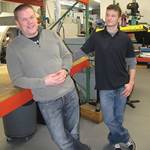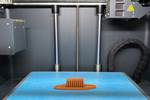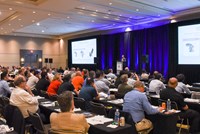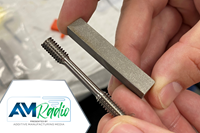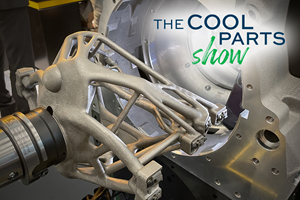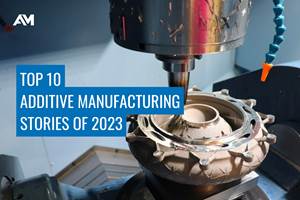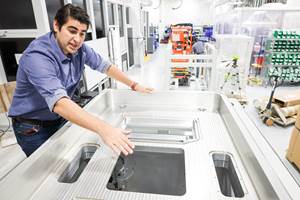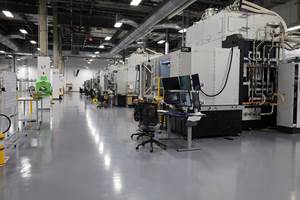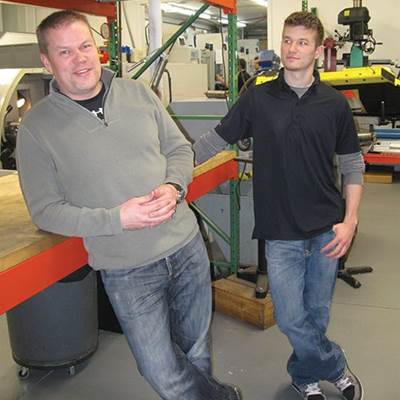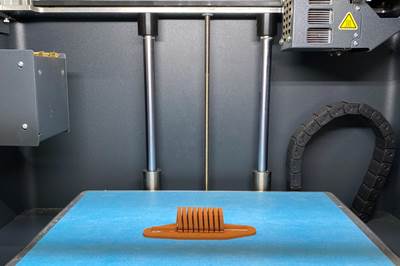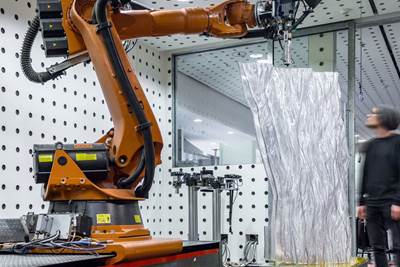In other types of manufacturing, it’s clear how to refer to businesses that perform certain processes — machining is done at a shop, injection molding is done by a molder and casting is done at a foundry. But what do we call businesses that do additive manufacturing? The term “service bureau” used to be a good fit, but as additive moves from prototyping to production, this term is losing relevance, and we’re left without a good way to refer to companies that do production additive manufacturing. This is especially true for companies that started with 3D printing, as opposed to ones that have experience with other manufacturing processes.
In this episode of AM Radio, cohost Peter Zelinski and I try to figure out why there’s no universal term for additive manufacturing businesses, and suggest a few possible names. Listen to the episode above or on your preferred podcast app, or read on for a transcript of our conversation.
Transcript
Peter Zelinski
Welcome to AM Radio, the show where we tune in to what's really happening and additive manufacturing. I'm Pete Zelinski. I'm joined this episode by Julia Hider, we're going to talk about additive manufacturing businesses, what do we even call them? We need a word. And then we're gonna talk to Julia and talk about Julia, who is this new voice we get to hear in Additive Manufacturing Media. That's coming up on this episode of AM Radio.
Julia Hider
The AM Radio Podcast is brought to you by the Additive Manufacturing Conference and Expo, the leading industry event focused on 3D printing for production. Plan to join us October 12 through 14th, at the Duke Energy Center in Cincinnati, Ohio, Learn more at additiveconference.com.
So Pete, I've been covering additive for a few months now and there's something that I've noticed that I want to talk about. Sometimes when I'm writing about a company that provides additive manufacturing services, I don't know what to call that type of business or how to refer to it. You know, I've seen that term service bureau before, but I know that doesn't always apply. So I wanted to start off by talking about what the term service bureau means and where it comes from.
Peter Zelinski
Yeah, let's talk about this. Yeah, what do we call these businesses, these manufacturers that are providing 3D printing services, particularly for production. So, service bureau, I feel like we're in a transition moment with that term. Many businesses embrace that term gladly and many others want to distance themselves from it. What it has meant in in earlier decades, say when 3D printing was associated almost entirely with with prototyping, and as a design aid, like, get a look and feel version of your part you can pass around in a meeting or try out in a test assembly, say, design engineers in need of 3D printing services could go to a service bureau that would that would 3D print these prototype objects for them. Design engineers in need of in need of a prototype could go to these these 3D printing service bureaus to 3d print these these objects for them. And so some, or many believe that service bureau still has that connotation, and that's what the business is. And then as we get into part production scale, part production, relying on 3D printing as a part making process, that it's a different kind of facility that does that in industrial facility, and and we need an industrial term.
Julia Hider
Yeah, I think that makes sense. The distinction between, you know, prototyping and production, and I guess we just do need a new term for that. You know, in covering traditional manufacturing, it's pretty clear what to call different types of companies. You have captive shops and contract manufacturers and job shops, but you can always just refer to all of those as shops. So does that term make sense for additive manufacturing too?
Peter Zelinski
Wow, so Okay, so let's play with that a little. A shop. So short form of machine shop, in some cases, or or like workshop, a shop, you could use that word farther than just a machine shop. And as I sit here talking to you, I'm actually not sure how far it goes. If you think about it. There's other types of part making facilities. Like if you're doing injection molding, would you ever call that a shop? I don't think you would.
Julia Hider
Would you just call that a molder, or...
Peter Zelinski
Yeah, you call it a molder and, or maybe it would be the plant, but yeah, they would be they'd be a molder and and Okay, if you're doing casting, it's a foundry. And if you're doing forging, like that's technically a forge, except I don't think people doing foraging called refer to themselves with that word, all that often. And meanwhile, like, if you said, if you were doing casting, and you said, casually, you're headed out the door of your home going to work and say, I go into I'm going to the shop, like that would kind of make sense. The word would kind of fit the hair. So even shop sort of has this envelope of actual applicability, and they're sort of the edges of that are kind of fuzzy. So there's, so that's one. What do you think about that could could accompany doing 3D printing for production? Is that a shop?
Julia Hider
I think it could be feels a little weird to refer to a company just doing 3D printing as a shop. I was thinking about that shop that we visited outside of Dayton called RPG and they do both machining, and they're starting to get into metal additive manufacturing with a Markforged Metal X. But I looked at that article, I referred to that company as a shop like 20 times throughout the article, and it's in the headline. So that didn't feel weird for me. But it would feel weird to call a company that just it production additive manufacturing shop. And I don't know why.
Peter Zelinski
This is so interesting. So yeah, like so RPG, they were already a shop, a machine shop. And there's, there's tons of examples of that established manufacturer, if an established manufacturer goes into 3D printing, then whatever word already was associated with them, we can keep using that word,
Julia Hider
As long as they keep doing that kind of work, I guess.
Peter Zelinski
Yeah. But if you're, but yeah, if you're but if you're natively 3D printing, then we don't have a word for that. Can I take this conversation a whole other place? So listen to this, there is also kind of the agriculture analogy to if you have enough, similar 3D printers, sometimes we call that a print farm, right? And, and which is sort of, like you're waiting for the parts to grow, and you harvest them. And, and there was like, there was even a time where, briefly, a sort of, like a casual word for 3D printing was growing apart. And there was even a time in, in in the magazine, that we would use that word it appeared on the cover once. And that cover is like an example of how this terminology is changing, and how how we're wrestling through this, because like that term has become cringy. And embarrassing now, because nobody says grow apart anymore. But we still have print farms. So I wonder if just in the way terminology evolves? Is there a solution to the question you're raising that might emerge from that analogy? Is it a printer field, or a printer plot? Or the print garden?
Julia Hider
Print garden? I like that. That'd be like a smaller company.
Peter Zelinski
Yeah. Okay. Okay. We're gonna tentatively put that on the table as a possibility— the print garden.
Julia Hider
Yeah I guess we haven't really come to any conclusions in this conversation. But if anybody has any terms that they refer to their company that we haven't covered in this conversation, let us know.
Peter Zelinski
I love that. Okay, if you're listening to this, what is the term for a business that does production through 3D printing? What is the nickname term? What is the word like shop that we can apply to that kind of business? We want some ideas and we get a lot of good ideas. We're going to revisit this topic.
Julia Hider
Yes, I think that's a good idea. All right.
Peter Zelinski
We'll leave it at that. That does it for this half of the episode. Stay tuned. We're going to learn a little bit more about Julia Hider right after these messages.
Julia Hider
The AM Radio Podcast is brought to you by the Additive Manufacturing Conference and Expo, the leading industry event focused on 3D printing for production. The conference takes a practical applications based look at the machines, materials and methodologies being used to create and use tools and components. The event is designed for owners, executives and engineers as well as OEMs involved in durable goods manufacturing. Join the additive manufacturing team in Cincinnati, Ohio for two days of in depth conference sessions, exhibits and networking opportunities with am experts. Also on the expo floor, check out the finalist entries in the Cool Parts Showcase, a contest to find the next subject of our video series The Cool Parts Show. Be sure to vote on your favorite. The Additive Manufacturing Conference and Expo runs October 12 through 14. Find out more details and register at additiveconference.com.
Related Content
3D Printed Cutting Tool for Large Transmission Part: The Cool Parts Show Bonus
A boring tool that was once 30 kg challenged the performance of the machining center using it. The replacement tool is 11.5 kg, and more efficient as well, thanks to generative design.
Read MoreTop 10 Additive Manufacturing Stories of 2023
Laser powder bed fusion, proprietary AM processes, machining and more made our list of top 10 articles and videos by pageviews this year.
Read MoreSeurat: Speed Is How AM Competes Against Machining, Casting, Forging
“We don’t ask for DFAM first,” says CEO. A new Boston-area additive manufacturing factory will deliver high-volume metal part production at unit costs beating conventional processes.
Read MoreVulcanForms Is Forging a New Model for Large-Scale Production (and It's More Than 3D Printing)
The MIT spinout leverages proprietary high-power laser powder bed fusion alongside machining in the context of digitized, cost-effective and “maniacally focused” production.
Read MoreRead Next
Additive Manufacturing in the Job Shop
This small shop invested in production 3D printing in part because its owner expects other manufacturers to make the same move. He wanted a head start.
Read MoreWhat Distinguishes Additive Manufacturing?
Is a 3D printer just a machine tool working in reverse? Or is it something else entirely? Stephanie Hendrixson, Peter Zelinski and Julia Hider discuss in this episode of AM Radio.
Read More3D Printing Brings Sustainability, Accessibility to Glass Manufacturing
Australian startup Maple Glass Printing has developed a process for extruding glass into artwork, lab implements and architectural elements. Along the way, the company has also found more efficient ways of recycling this material.
Read More


